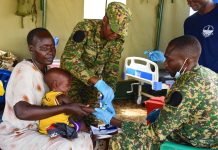strides in the fight against cancer, transforming cancer care in Uganda. UCI’s remarkable progress includes the establishment of state-of-the-art treatment facilities, the introduction of cutting-edge technologies, and groundbreaking research that has set new standards in cancer care. This press release highlights UCI’s key achievements, including investments in advanced treatment equipment, the establishment of regional cancer centers, the creation of modern diagnostic labs, advancements in pediatric cancer care, and innovative research that is shaping the future of cancer treatment in Uganda.
Expanding Cancer Care: Regional Cancer Centers Across Uganda
UCI is committed to increasing access to comprehensive cancer care services by establishing regional cancer centers strategically located across Uganda. These centers bring life-saving services closer to patients in underserved regions, significantly reducing the need for long-distance travel to the national capital, Kampala, and improving access to cancer care and imrpoving survival from cancer.
UCI Northern Uganda Regional Cancer Center (UCI – Gulu)
Located in northern Uganda, the Gulu Regional Cancer Center serves as a crucial hub for cancer treatment, providing essential services such as cancer diagnostics, oncology imaging, surgery, chemotherapy, and palliative care. This facility has significantly reduced the travel burden for patients in the northern region, offering timely care and improving cancer outcomes. The UCI – Gulu center is fully operational.
UCI West Nile Regional Cancer Center (UCI – Arua)
The Arua Regional Cancer Center, catering to the West Nile region, will play an instrumental role in enhancing cancer care accessibility. With state-of-the-art services such as cancer screening, chemotherapy, and radiation therapy, this facility will improve early detection and treatment for the people of Arua and surrounding areas. Construction of this centre is scheduled to start in Fy 2025/26.
UCI Western Uganda Regional Cancer Center (UCI – Mbarara)
In southwestern Uganda, the Mbarara Regional Cancer Center will provide advanced diagnostic and treatment facilities, contributing significantly to the improvement of cancer care in the region. With cutting-edge equipment and a skilled healthcare team, the UCI – Mbarara is an important center in improving survival rates in southwestern Uganda.Construction of a new state of the art faiclity in Mbarara is scheduled to start in Fy 2025/26.
UCI Eastern Uganda Regional Cancer Center ( UCI – Mbale)
The Mbale Regional Cancer Center will serve Uganda’s eastern region, offering comprehensive cancer care, from early detection through to treatment. With modern diagnostic technologies and specialized treatment services, the center reduces the need for patients in this region to seek care in Kampala, making cancer treatment more accessible.Construction is also expected to start in FY 2025/26.
State-of-the-Art Cancer Treatment Machines
The Uganda Cancer Institute has invested in state-of-the-art treatment equipment which has played a pivotal role in elevating the standard of cancer care. These advanced technologies significantly enhance the accuracy of diagnoses, the precision of treatments, and ultimately improve patient outcomes.
Linear Accelerators (LINAC)
The introduction of linear accelerators (LINAC) at UCI marks a significant advancement in radiotherapy. LINACs are highly effective at delivering high-precision radiation therapy to cancer patients, particularly those with breast, prostate, and head and neck cancers. These machines are recognized globally as the gold standard in radiation therapy, ensuring optimal treatment results while minimizing damage to healthy tissues.
Molecular Imaging and Therapy
UCI has pioneered the introduction of molecular imagingand molecular therapy in Uganda. The UCI has commissioned a SPECT CT scan and is in the process of constructing a PET facility. The molecular imaging centre at the UCI will offer enhanced diagnostic capabilities, enabling early detection of cancer before symptoms manifest. These imaging technologies improve diagnostic accuracy and ensure timely intervention, crucial for increasing survival rates.
Additionally, UCI is embracing molecular therapy, which is tailored to the genetic makeup of individual tumors. This personalized approach to treatment reduces side effects and increases the efficacy of therapy, placing UCI at the forefront of advanced cancer care in Uganda.
Cutting-Edge Laboratories: Pathology and Diagnostics
UCI has made substantial investments in state-of-the-art laboratories, which play a key role in diagnosing cancer, guiding treatment decisions, and supporting research initiatives. One of the most notable achievements has been the development of modern pathology labs that ensure high-quality diagnostic services for cancer patients.
Modern Pathology Laboratories
UCI’s pathology labs are equipped with the latest diagnostic tools to analyze tissue samples, allowing for early-stage detection of cancer. These labs conduct critical histopathological examinations that form the basis of accurate diagnosis and the development of personalized treatment plans.
UCI’s pathology labs also serve as vital centers for cutting-edge cancer research, helping to identify the genetic and molecular factors contributing to cancer in the Ugandan population. This research is shaping the future of cancer care both in Uganda and across the East African region.
Genomic Medicine and Cancer Research
UCI’s commitment to genomic research is unraveling the genetic causes of cancer types prevalent in Uganda. By analyzing the genetic makeup of cancer cells, researchers are identifying new targets for treatment, paving the way for personalized therapies that are more effective and have fewer side effects. This research is not only crucial for understanding cancer development but also for developing novel treatments tailored to the genetic profiles of individuals.
Advancements in Pediatric Cancer Care
UCI has made notable progress in expanding and improving pediatric cancer care, addressing the unique needs of children diagnosed with cancer. Pediatric oncology requires specialized approaches to treatment, and UCI is at the forefront of ensuring that children across Uganda have access to high-quality, compassionate care.
Expansion of Pediatric Cancer Services
The establishment of a dedicated pediatric oncology unit at UCI marks a significant milestone in the Institute’s commitment to improving care for children with cancer. This unit, staffed by highly trained pediatric oncologists and supported by a multidisciplinary team, offers specialized care for children with cancers such as leukemia, lymphomas, and solid tumors.
In addition, UCI has implemented the latest chemotherapy protocols for pediatric cancers. These protocols ensure that children receive optimal treatment while minimizing side effects. UCI’s pediatric unit is also expanding access to targeted therapies, which provide tailored treatment plans to improve treatment efficacy and reduce toxicity.
Support for Pediatric Cancer Survivors
UCI’s commitment to pediatric cancer care extends beyond treatment. The Institute has developed a survivorship care program designed to provide long-term follow-up for children who have completed their cancer treatment. This program monitors for potential recurrences and addresses late effects of cancer therapies, ensuring that survivors lead healthy, fulfilling lives after their treatment.
National Cancer Control Plan (NCCP)
A major achievement for UCI has been its involvement in the development of Uganda’s National Cancer Control Plan (NCCP), which was established in 2024. The NCCP provides a strategic framework for addressing the rising cancer burden in Uganda, focusing on prevention, early detection, treatment, and palliative care. As a key player in implementing the NCCP, UCI has significantly contributed to the expansion of cancer care services, including the establishment of regional cancer centers and the expansion of screening programs for cervical and breast cancer.
Furthermore, the NCCP emphasizes increasing public awareness about cancer prevention, which is critical to reducing the incidence of cancer in Uganda. Through its leadership, UCI is helping to foster a cancer-aware society that seeks early detection and effective prevention strategies.
Conclusion
The Uganda Cancer Institute’s outstanding achievements in cancer care, including the establishment of regional cancer centers, the introduction of cutting-edge treatment technologies, and its leadership in pediatric oncology, underscore its unwavering commitment to improving cancer outcomes for the people of Uganda and beyond. UCI’s efforts have made cancer care more accessible, effective, and patient-centered, offering hope to countless individuals and families affected by cancer.
With ongoing investments in infrastructure, technology, and partnerships, UCI is well-positioned to continue its leadership role in advancing cancer care and control in Uganda and across Africa.























